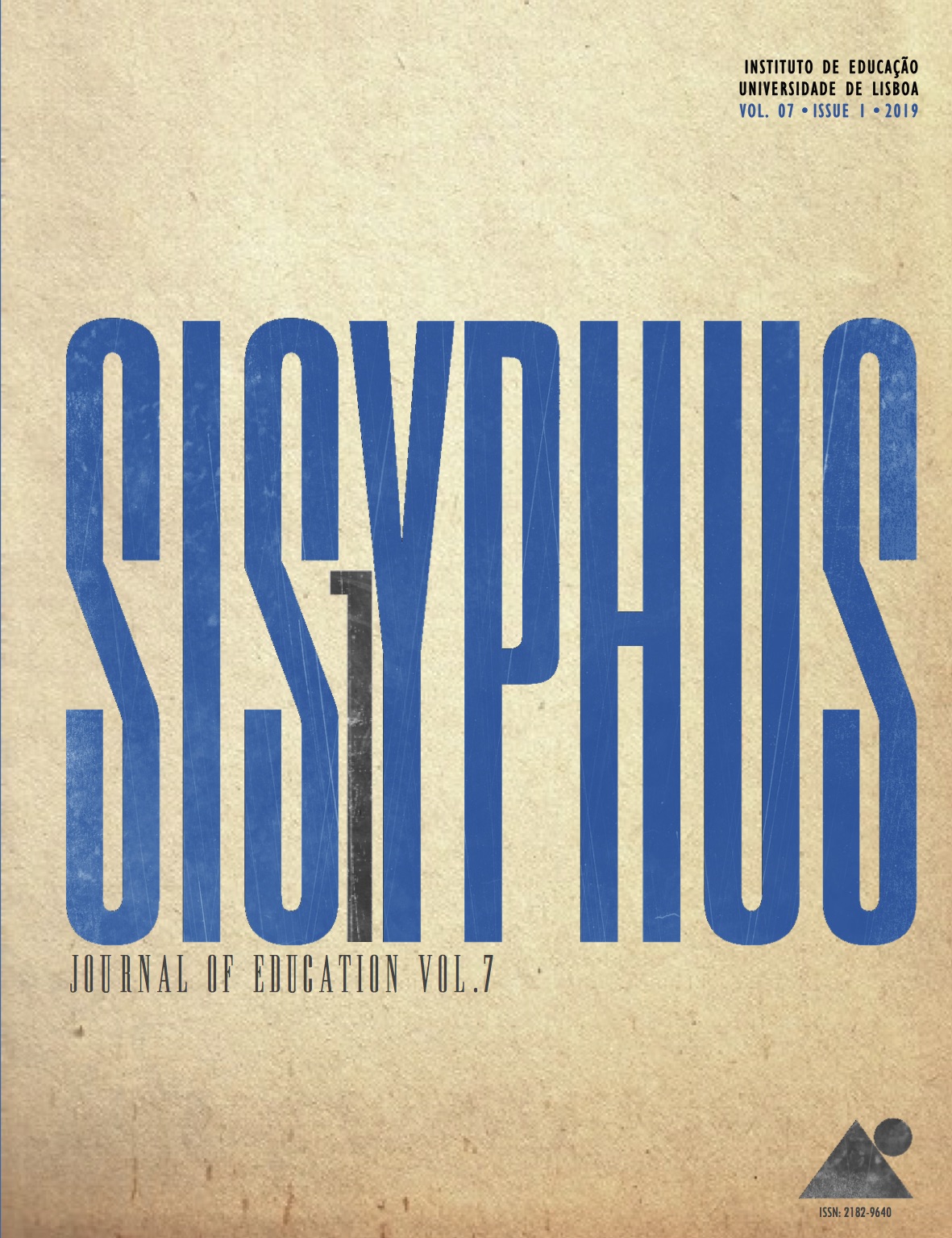Learning English with Tablets
A Study with Special Educational Needs Students
DOI:
https://doi.org/10.25749/sis.15859Keywords:
technology-enhanced learning (TEL), mobile assisted language learning (MALL), teaching english as a foreign language (TEFL), special educational needs, tabletsAbstract
The favourable impact of integrating mobile technologies into the learning processes in the classroom is currently a complex subject where research has not yet found consensus. However, the benefits of mobile technology for students with special educational needs tend to be recurrently evidenced in the literature. The results of a study developed with tablets in the 3rd cycle of basic education in a school in the Lisbon area, specifically in English language learning, are hereby presented. The implementation of a tablet integration program over the course of a school year allowed the collection of quantitative and qualitative data to explore the affinities between mobile learning and foreign language learning. The study focuses on the following variables: motivation for English language learning, communicative competence (specifically, oral production in English) and digital competence, comparing students with and without special educational needs.
Downloads
References
Bogdan, R. C., & Biklen, S. K. (2007). Qualitative Research for Education: An Introduction to Theories and Methods (5th Edition). London: Pearson.
Burston, J. (2015). Twenty years of MALL project implementation: A meta-analysis of learning outcomes. ReCALL, 27(1), 4-20.
Clark, W., & Luckin, R. (2013). What the research says – iPADS in the classroom. London: London Knowledge Lab – Institute of Education University of London.
Cohen, L., Manion, L., & Morrison, K. (2007). Research methods in education. London: Routledge.
Comissão das Comunidades Europeias. (2003). Communication from the Commission to the Council, the European Parliament, the European Economic and Social Committee and the Committee of the Regions: Promoting Language Learning and Linguistic Diversity: An Action Plan 2004-2006. Retirado de: http://eur-lex.europa.eu/legal-content/EN/TXT/PDF/?uri=CELEX:52003DC0449&from=EN
Comissão Europeia. (2014). Digital Agenda for Europe. Retirado de: http://eige.europa.eu/resources/digital_agenda_en.pdf (Acesdido em 13 de novembro de 2018).
Conselho da Europa. (2001). Quadro europeu comum de referência para as línguas. Aprendizagem, ensino e avaliação. Lisboa: Edições Asa.
Coutinho, C. P. (2013). Metodologia de Investigação em Ciências Sociais e Humanas: Teoria e Prática (2ª edição). Coimbra: Almedina.
Creswell, J. W. (2007). Projeto de pesquisa: métodos qualitativo, quantitativo e misto. Porto Alegre: ARTMED.
Creswell, J. W., Plano Clark, V. L., Gutmann, M. L., & Hanson, W. E. (2003). Advanced mixed methods research designs. In A. Tashakkori & C. Teddlie (Eds.), Handbook of mixed methods in social and behavioral research (pp. 209-240). Thousand Oaks, CA: SAGE.
Fernández-López, A., Rodríguez-Fórtiz, M., Rodríguez-Almendros, M., & Martínez-Segura, M. (2012). Mobile learning technology based on iOS devices to support students with special education needs. Computers & Education, 61, 77-90.
Ferrari, A. (2013). DIGCOMP: A framework for developing and understanding digital competence in Europe. Retirado de: http://publications.jrc.ec.europa.eu/repository/bitstream/JRC83167/lb-na-26035-enn.pdf
Ferrari, A., Brečko, B., & Punie, Y. (2014). DIGCOMP: A framework for developing and understanding digital competence in Europe. Digital Literacies and eCompetence, eLearning Papers, 38, 3-16.
Gang, B., Zainudin, S., Ibrahim, H., & Chun, L. (2017). A speech-language therapy tool using interactive book app in bahasa Malaysia for special needs children. Journal of Theoretical & Applied Information Technology, 95(13), 3041-3061.
Gardner, R. C. (1985). The Attitude/Motivation Test Battery: Technical Report. Ontario: University of Western Ontario Department of Psychology.
Gawelek, M.A., Spataro, M., & Komarny, P. (2011). Mobile perspectives: On iPADs - why mobile? EDUCAUSE Review, 46(2), 28-32.
Goodwin, K. (2012). Use of tablet technology in the classroom. New South Wales, Australia: Institute of Early Childhood Macquarie University - Curriculum and Learning Innovation Centre.
Higgins, S., Xiao, Z., & Katsipataki, M. (2012). The impact of digital technology on learning: A summary for the education endowment foundation – full report. Durham, UK: Education Endowment Foundation – Durham University.
Johnson, G. (2013). Using tablet computers with elementary school students with special needs: The practices and perceptions of special education teachers and teacher assistants. CJLT/RCAT, 39(4).
Kukulska-Hulme, A. (2009). Will mobile learning change language learning? ReCALL, 21(2), 157-165.
Kukulska-Hulme, A. (2010). Charting unknown territory: Models of participation in mobile language learning. International Journal of Mobile Learning and Organisation, 4(2), 116-129.
Musti-Rao, S., & Walker, Z. (2017). Use of mobile technology in the classroom. Retirado de: http://www.council-for-learning-disabilities.org/infosheets-supporting-translation-of-research-to-practice
Pegrum, M., Oakley, G., & Faulkner, R. (2013). Schools going mobile: A study of the adoption of mobile handheld technologies in Western Australian independent schools. Australasian Journal of Educational Technology, 29(1), 66-81.
Pestana, M. H., & Gageiro, J. N. (2008). Análise de Dados para Ciências Sociais – A Complementariedade do SPSS (6ª Edição). Lisboa: Edições Sílabo.
Traxler, J. (2011). Aprendizagem móvel e recursos educativos digitais do futuro. Cadernos ERTE - Sacausef, 7, 36-47.
UNESCO. (2011). Accessible ICTs and personalized learning for students with disabilities: A dialogue among educators, industry, government and civil society. Retirado de: http://www.unesco.org/new/fileadmin/MULTIMEDIA/HQ/CI/CI/pdf/accessible_ict_personalized_learning_2012 .pdf
UNESCO. (2013). Policy guidelines for mobile learning. Retirado de http://unesdoc.unesco.org/images/0021/002196/219641e.pdf
Downloads
Published
Issue
Section
License
Copyright (c) belongs to Sisyphus - Journal of Education. However, we encourage issued articles to be published elsewhere, provided that Sisyphus authorization is asked for and that authors integrate our original source citation and a link to our website.
Author Self-Archiving Policy
Author(s) are permitted to self-archive the final published version in institutional or thematic repositories, and in their personal or institutional websites.
DORA Signer
The Instituto de Educação da Universidade de Lisboa, Sisyphus' Publisher, is a San Francisco Declaration on Research Assessment signer.






